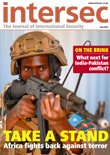Committed to security
Anthony Tucker-Jones and former Armed Forces Minister Nick Harvey discuss the latest national and international security threats, and ask whether British security policy lost its way
ATJ: The terrorist attack in Ottawa last year highlighted flawed security with the Canadian Parliament. Are you content that Westminster is as secure as it can be?
NH: To make Westminster totally secure would entail closing that stretch of the Thames, re-routing the Heathrow flight path, closing down St Thomas’s Hospital, laying entirely new sewerage through the area, closing the estate entirely to visitors and non-pass holders and so on. I needn’t go on. A balance has to be struck. It has got considerably tighter since the threat level was raised this autumn.
ATJ: There has been much recent discussion in the UK and across the EU about the best way to combat “terror tourists” and the threat they pose to their home countries. Realistically what can be done?
NH: Exchange of intelligence with allies is the key means to fight this, along with long-term engagement policies to try and prevent young people becoming radicalised in the first place. Offering a way back into our society is also necessary, even if some people have to swallow hard to accept it.
ATJ: When the Home Office seems to have little idea of how many foreign criminals are on the loose in the UK, are you concerned that the security service does not have a handle on the numbers of militants in the country?
NH: I have considerably more confidence in the latter than the former. The failure to deport foreigners who have completed prison terms seems no better now than when Charles Clarke was forced to resign over the issue and the Home Office was described as “unfit for purpose”. And despite all the talk, we still don’t seem to check people out of the country properly – meaning that we don’t know who is here. By contrast, the security service seems to carry across its task well, but life has been made harder by Snowden and the reaction to it.
ATJ: Now that we have withdrawn from Afghanistan, what’s your prognosis? Clearly the Taliban is biding its time for the spring fighting season – can Kabul keep control in 2015?
NH: The capacity of the Afghan security forces is genuinely impressive, so the outlook is by no means hopeless though it will be patchy. Critical to the prospects will be the level of continuing international engagement – not in a military sense so much as in a financial, trade and aid sense. The Najibullah regime left by the Soviets would have survived had not the cash been turned off.
ATJ: Last year the UK’s response to ongoing troubles in Gaza, Iraq and Syria was very measured. Do you feel this has been the right approach?
NH: Yes. We can only do anything on any of these fronts as part of the international community. Our history on Israel-Palestine is so messy that we are best working there as part of the EU. Offering some help with air power in Iraq is largely symbolic – we do not bring anything the US couldn’t do on its own, but it is right to show willing. We would be daft to get involved in Syria at all – it is not a strategic interest. In the 19th Century, when we ruled the waves, we regularly sat various situations out – we shouldn’t be perturbed about doing the same now. General Dannatt said that if you go round kicking people’s doors in, you create a moral obligation to stay around afterwards and help clear up. Syria is in such chaos it could take 25-30 years to clear up and we just don’t have the capacity to commit to such an enterprise.
ATJ: Critics argue that sending half a dozen jets to bomb IS targets in Iraq in the wake of an already intensive US air campaign is little more than window dressing – how do you respond to such criticism?
NH: It is essentially true that our contribution is symbolic rather than game-changing. Sadly that is the consequence of decades of defence cuts. Listening to the debate in Parliament about whether to get involved, some of my colleagues clearly just don’t realise how much our capacity has reduced.
ATJ: We have spoken of the terror threat posed to the UK by radicalised young Britons – do you feel the UK’s bio security is adequate in light of the Ebola epidemic sweeping through West Africa.
NH: It is probably just about adequate to deal with any normal spread of the epidemic, but if you are suggesting germ warfare by terrorists then it is difficult to know.
ATJ: Is not the fear that a terrorist could deliberately infect them self and fly to anywhere in the world?
NH: I suppose so. Other than screening for people with fevers coming from Africa and keeping an eye on known troublemakers, it is hard to see what more could obviously be done.
ATJ: Now that Iraq and Syria are all but failed states do you think they will become the breeding ground for something far worse than IS? Or is the problem simply regional?
NH: No, the problem can now become more than simply regional and the risk is as you describe. It is also very hard to see what can be done beyond rendering assistance to regional and national forces. The beheadings were, in my view, aimed precisely at levering the West into military action, and this will be the militants’ chief recruiting weapon.
ATJ: Do you think the emergence of the Islamic State in Iraq and the Levant now represents a return to the bad old days of Osama Bin Laden?
NH: Arguably very much worse, as it is hard to discern any rational explanation for much of what they do, whereas Bin Laden had at least some perceptible objectives. The more extreme behaviour also gets the young impressionable jihadists even more fired up.
ATJ: It has been argued that the decision not to bomb the Assad regime in Damascus led indirectly to the Islamic militants overshadowing the Free Syrian Army – is this a fair assumption and should the West beheld culpable for this situation?
NH: No – it is not clear that bombing the regime would have brought about the necessary or desirable changes needed on the ground. We must wean ourselves off the view that deep political differences can be resolved in the air.
ATJ: Or should we hold Saudi Arabia and Qatar responsible for unleashing IS thanks to its support for Sunni militants?
NH: The resources they have received from within the region are part of the problem.
ATJ: Why do you think that the Islamic State has been able to make such enormous gains across both Syria and Iraq?
NH: Syria is in a state of total chaos and carnage – anyone could make considerable headway. Iraq is more tricky. We continue to pay a huge price for the idiocy of ‘De-Bathification’ post the Western invasion, and the leadership vacuum which resulted. Despite being well-equipped and technically trained, the national forces just didn’t seem to have the heart for the task.
ATJ: In the case of Iraq, do you feel calling IS fighters “jihadists” or “militants” is a misnomer, when in fact they are clearly a well-armed militia made up of large numbers of Sunnis from the Iraqi army.
NH: Nothing stops jihadists or militants from being well armed, resourced or organised. But it is true that their rise appeared to take everyone by surprise and is on an unprecedented scale.
ATJ: You have viewed first-hand the troubled aftermath of the Arab Spring. Do you think Egypt can successfully ride out the transition to democracy?
NH: Possibly. They have at least got some stability now, and the new constitution – somewhat akin to the American political system – has sensible checks and balances in it. New electoral rules are not very convincing, however, and in practical terms the president will be all-powerful for a long time to come. Unless a genuinely pluralist system can evolve during the current stability, then one wonders whether troubles might return at some point in the future. But Rome wasn’t built in a day, and neither are functioning democracies.
ATJ: Can Egypt keep the militants in the Sinai under control or will the failure of the Middle East Peace Process continue to have a negative effect on Egypt and Jordan.
NH: It really is true, as is often said, that the MEPP has impacts and implications far beyond the geography immediately affected, with Egypt and Jordan among those most impacted. On the specific question of the Sinai, I would back the Egyptians to keep it largely contained.
ATJ: Is there a very real prospect that, with the Muslim Brotherhood driven underground, they will climb into bed with IS or are they cut from a different cloth?
NH: There will be some overlap but I hope they are genuinely very different.
ATJ: What’s your prognosis for Libya and Tunisia?
NH: Tunisia looks more promising than Libya, where one could have predicted that the fall of a despot would result in chaos – because it almost always does. It remains very dangerous there in all senses.
ATJ: Liberia and Serra Leone are struggling with Ebola, have very weak economies and are still recovering from very bloody wars. Are they likely to become failed states once again?
NH: Left to their own devices their economies will fail and chaos will ensue. It is entirely down to the international community, including the African Union, to prevent that being allowed to happen.
ATJ: The Nigerian government is currently battling its own jihadist threat in the shape of Boko Haram – is it a fight the Nigerian Army can win or contain?
NH: Very difficult indeed – it is never clear how much Boko Haram is really motivated by any religious dimension at all, or whether that is a cloak of convenience for what is more a case of violent racketeering. Either way, it is more a question of containment than winning. I am not even clear whether the problem is theoretically capable of being resolved politically.
ATJ: Since 9/11, on average at least one major terrorist plot has been thwarted every year – can we maintain this level of success?
NH: Possibly, but it needs the public to wake up to the scale of the threat and the necessity of the measures which have been taken to frustrate it. Some of the commentary on electronic intercepts has been depressingly stupid, but clearly effective scrutiny of agencies is some way away yet.
ATJ: In conclusion, has British security policy lost its way in recent years and if so is this as a result of the financial and security burdens created by the UK’s involvement in Iraq and Afghanistan?
NH: Our capacity is drastically reduced, not only in military hard power but in the disastrous cuts to the Foreign Office’s international networks – all to save peanuts. We continue to spend billions on nuclear defence despite our security assessment saying we face no threat, yet we leave ourselves under-defended against the tier-one threats we know to be real and imminent.
Anthony Tucker-Jones is intersec’s Terrorism and Security Correspondent. He is a former defence intelligence officer and is now a widely published defence commentator specialising in regional conflicts and counter terrorism.









